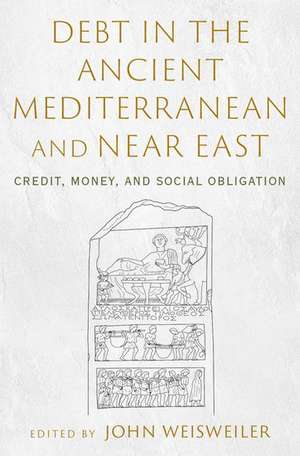Debt in the Ancient Mediterranean and Near East: Credit, Money, and Social Obligation
John Weisweileren Limba Engleză Hardback – 22 dec 2022
Preț: 493.21 lei
Preț vechi: 545.42 lei
-10% Nou
Puncte Express: 740
Preț estimativ în valută:
94.38€ • 102.84$ • 79.53£
94.38€ • 102.84$ • 79.53£
Carte disponibilă
Livrare economică 22-28 martie
Preluare comenzi: 021 569.72.76
Specificații
ISBN-13: 9780197647172
ISBN-10: 0197647170
Pagini: 290
Dimensiuni: 242 x 159 x 27 mm
Greutate: 0.57 kg
Editura: Oxford University Press
Colecția OUP USA
Locul publicării:New York, United States
ISBN-10: 0197647170
Pagini: 290
Dimensiuni: 242 x 159 x 27 mm
Greutate: 0.57 kg
Editura: Oxford University Press
Colecția OUP USA
Locul publicării:New York, United States
Recenzii
Debt in the Ancient Mediterranean and Near East is a remarkable book. Weisweiler and his colleagues expand the very notion of what the study of the ancient economy can reveal. The more capacious view afforded by anthropology opens our eyes to the embedding of economic thought and conduct in matrices of social relations and systems of value of enormous complexity. At the same time, the chronological and geographic ambition of the work endows it great conceptual and comparative significance. One senses the enriching of an entire field.
This book is the first to draw attention to Graeber's Debt as a major text for the study of pre-modern economies, and makes a compelling case that we should be reading it alongside Finley, Polyani, Weber and now Piketty.
This is a fascinating volume, which tests some of Graeber's main theses on the link between coins, debt and slavery in the Axial Age. Although Graeber opposed the paradigm of New Institutional Economics that stable institutions protecting private property are more favorable to growth, the volume fully acknowledges the role of markets in ancient societies. The point of the various papers of this volume is not simply to illustrate Graeber's views, but rather to show how they can fruitfully inspire new research. We should be grateful to John Weisweiler for putting together this splendid and thought-provoking volume.
Offers a compelling discussion of modern assumptions of the universality of notions of value and economic behaviour...; Above all, the book shows the value of Graeber's work as an 'explanation framework,' as framed by Weisweiler, for the study of the roles of debt and money in the shaping of human relationships and for rethinking ancient and early medieval economic thought. The book is nicely dedicated to David Graeber's memory in a posthumous recognition of the importance of his work.
Beyond the documenting of contrarian facts, the individual studies are valuable historical analyses of debt both as an economic fact, as an instrument of social coercion, and as a moral category of thought (as well as related matters).
This book is the first to draw attention to Graeber's Debt as a major text for the study of pre-modern economies, and makes a compelling case that we should be reading it alongside Finley, Polyani, Weber and now Piketty.
This is a fascinating volume, which tests some of Graeber's main theses on the link between coins, debt and slavery in the Axial Age. Although Graeber opposed the paradigm of New Institutional Economics that stable institutions protecting private property are more favorable to growth, the volume fully acknowledges the role of markets in ancient societies. The point of the various papers of this volume is not simply to illustrate Graeber's views, but rather to show how they can fruitfully inspire new research. We should be grateful to John Weisweiler for putting together this splendid and thought-provoking volume.
Offers a compelling discussion of modern assumptions of the universality of notions of value and economic behaviour...; Above all, the book shows the value of Graeber's work as an 'explanation framework,' as framed by Weisweiler, for the study of the roles of debt and money in the shaping of human relationships and for rethinking ancient and early medieval economic thought. The book is nicely dedicated to David Graeber's memory in a posthumous recognition of the importance of his work.
Beyond the documenting of contrarian facts, the individual studies are valuable historical analyses of debt both as an economic fact, as an instrument of social coercion, and as a moral category of thought (as well as related matters).
Notă biografică
John Weisweiler is University Lecturer in Ancient History and Fellow of St John's College, Cambridge. He is co-editor of Cosmopolitanism and Empire: Universal Rulers, Local Elites and Cultural Integration in the Ancient Mediterranean and Near East and author of From Republican Empire to Universal State: Senators, Emperors, Senators and Local Elites in Early Imperial and Late-Antique Rome.
